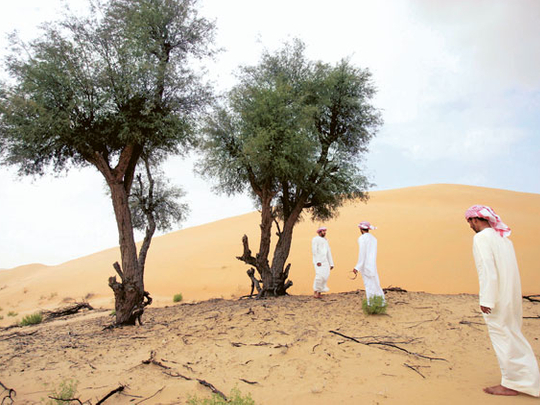
Dubai: Hundreds of endangered ghaf trees are springing up in Umm Al Quwain thanks to donations from individuals and businesses keen to combat desertification in the country.
A garden dedicated to the desert tree — revered for its longevity and capacity to survive in harsh environments — lies nestled close to the shore, flanked by mangroves.
Next month once the hot weather subsides, seeds will be planted in rows in tiny biodegradable pots and fertilised with home made compost until they are big enough to be moved and replanted in gardens or along roads. "Wherever they are needed," said Tatiana Antonelli Abella, co-founder of Goumbook.com, a green directory for the Middle East and creator of the Give a Ghaf campaign.
Desertification due to urban development has seen the loss of many clusters of ghaf trees in the UAE, or prosopis cineraria, an indigenous species to the region that requires little water but grows relatively slowly.
So far 550 trees have been planted, and more than 1,000 will be planted in November. The nursery lies within Ecoventure, an outdoor learning centre focused on schools and students offering field studies.
"We see individuals that want to do their bit for the environment and want to plant a tree," said Abella.
Earthy nutrients
"Many people still do not realise that the desert is not just sand and that we can plant ghaf trees without causing any harm. It's a species from this part of the world, can be replanted and doesn't use much water," she said.
"At the ghaf nursery, we are creating new trees from seeds. They are fertilised with Bokashi fertiliser and we irrigate them for five years," Abella added. A ghaf tree may only grow 1.5m in five years. The plot of land can accommodate thousands of trees and donors willing to plant their tree and visit the area afterwards are welcome to do so.
Bokashi is a method of turning food waste into earthy nutrients that can be added to soil. It also minimises the use of chemical fertilisers.
"The ghaf has so many stories associated with it. There were many uses for it as well... It is a valuable part of the UAE heritage," said Abella.
Giving a plant
To plant your own ghaf tree visit wwwgoumbook.com or go to the Future Green exhibition organised by Goumbook on Novermber 1 at Dubai Marina Mall. Stalls from environmentally-focused businesses will be displaying their products and there will be the opportunity to buy a tree.
Ghaf trees are evergreen and can tolerate drought well. They are possibly the sturdiest plants in the harsh desert. They can be seen growing on low sand dunes and along gravel plains in Abu Dhabi, Dubai, Sharjah and Ras Al Khaimah.












